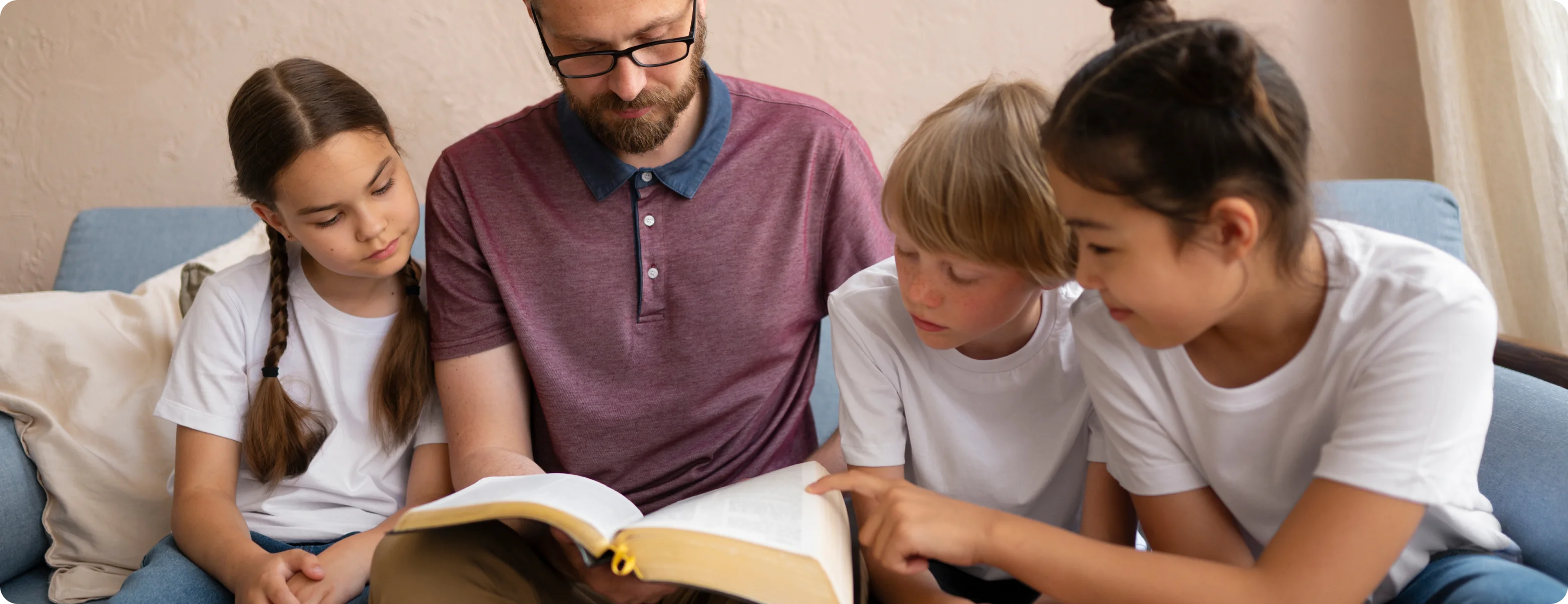The Benefits of Reading to Your Children: Social-Emotional Development

Stephanie Tsapakis
|
Published on May 4, 2022 · 2 min read


Stephanie Tsapakis
|
Published on May 4, 2022 · 2 min read

If you’ve endured a toddler tantrum over which half of the banana is the "right" half (spoiler alert: it's neither), or you can remember slamming a door in middle school because your parents just didn't understand!!!, you've experienced firsthand that it can be hard to identify and name our emotions when we’re feeling like we have steam coming out of our ears.
None of us learn well in moments of intense emotion, but as parents, we can often be left wondering how to address and teach coping strategies in an effective way. The answer? Books!
The books we provide to our young readers can teach coping strategies for managing big emotions, navigating social conflicts, and practicing mindfulness. The F to your children has long been proven by science, but it can be difficult to find time to read together!
During a child’s first five years of life, their brain is growing and developing at a rate that will never occur again during any stage of life. The vast majority of our language is developed during these critical years, and our brain is learning to make meaningful connections between concepts, feelings, and words.
By reading to your child, you are modeling mature language, patterns, emotions, communication, and the meaning of words. You are also using stories as a way to draw meaning from everyday activities and help your child understand the world. For example, if you read a book about sharing, the next time you are in a situation where your children are having a hard time sharing a toy, you can reference the story.
Or, if you happen to be reading a story that reminds you of a significant event from your child’s life, or an important life lesson, you can use the story as a guide to start talking with them and sorting through their feelings. Modeling emotional safety through narrative patterns is a common theme in children’s books, and you would be surprised how often those stories can come in handy while raising a child.
When we read fiction with children - whether they’re our students or our own family - we help to support their social-emotional development. With entire units of curriculum devoted to the topic and its emerging literary genre, social-emotional development is a complex concept.
To break it down, social-emotional development is a child’s ability to:
Teaching children about social-emotional development is an important part of parenting, but it can be overwhelming! Oftentimes, parents do not know how to start or what to focus on.
Purchasing and reading books about feelings or emotional regulation is a great tool! There is truly a children’s book for every kind of emotion, and they often provide the necessary vocabulary and visual aids to help children understand their own emotions. Additionally, children’s books can aid in the development of empathy through character perspectives.
Reading with your child is a great way to give direct attention to them, thus making them feel seen, heard, and loved. Spending quality time with your child can be difficult to fit into a day, but reading a book together can accomplish many of your parenting goals!
As your child gets older and begins to learn to read, or even memorize stories, you can use reading as a way to teach other skills like turn-taking, patience, listening skills, or shared reading. You can even take a story to the next level by asking your child to make up an alternate ending, or draw a new illustration or character to add to the story. Having conversations about the stories you read not only helps with reading comprehension skills but also fosters language and communication skills, in addition to trust in you as their caretaker.
When children read fictional stories, three important things happen. The first is that they might recognize themselves in the characters and plot. This helps children to feel connected. Not only that, when they observe and see how a character’s adversity plays out without having to actually wade into it, a framework may be provided for how to navigate challenging experiences that they may be experiencing, like divorce, loss of a loved one, or feeling like they don’t fit in.
The second important thing that takes place when children read fiction is that they learn how to empathize with and understand the feelings of others, a key building block towards getting along with peers and social problem solving. Personally, having taught many different age groups over the years, I’ve witnessed firsthand how fiction can evoke multiple emotions and promote really meaningful classroom discussion - all important aspects of learning to empathize and truly listen to what other people are saying.
When do children learn to read? How do we know what books to choose? Does reading daily really matter? Knowing what type of book to read or how long you should spend reading each day can be tricky. An important thing to remember is to listen to your child’s cues and communications. Here is a rough guide to help:
Infants (0-12 months) - Choose study books that are shorter in length and focus on rhythm, tone, and bonding.
Toddlers (1-3 years) - Look for books with lots of repetition and emotional themes. Books that teach emotion-related vocabulary are great for this age!
Preschoolers (3-5 years) - Books that use role-play and have longer stories can now be understood by your child. Use the lesson in each book to start a child-friendly discussion. In case you have ever wondered when children learn to read, it starts here! Children can begin learning basic letter sounds and phonemic awareness skills at this age.
School age (6-8 years) - Books that focus on empathy and solving real-world problems will be a big hit with this age! Be sure to match books to your child’s interests. Children should be developing their reading skills around this age. These are the primary years when children learn to read and should become relatively fluent readers.
Reading to children daily may feel challenging, so don't beat yourself up if you can't achieve this goal. However, trying to build in time might be easier if you plan to read books as part of a bedtime routine. The importance of reading to children should not be ignored. Plan to start getting your children ready for bed 45 minutes or so before you actually want them to sleep. Bathing, brushing teeth, and putting on pajamas can all be precursors to family story time. Once you are all snuggled together in bed, it will feel like the perfect time to share in reading together!
When our children read fiction, they're exposed to rich and descriptive language because the spoken and written words are often used in entirely different ways. The way one might have a conversation with a friend about the sun setting is far less complex than if an author describes for the reader what the sunset looks like from the perspective of a main character. The words an author uses to craft a story allow the reader to visualize what’s taking place, and this serves to improve vocabulary.
We know that exposure to rich vocabulary supports all readers in the development of literacy skills. For many of our students with learning differences, reading books in which they feel seen as well as supported academically and socially can have a profound impact on their confidence. In case you're wondering, my current favorite SEL book is Thelma the Unicorn by Aaron Blabey. What a hoot!
Organizations like LD Expert care deeply about your child’s education and truly want to see them thrive—academically, emotionally, and socially. Start building strong emotional connections, empathy, and literacy skills, one story at a time.
Looking for personalized support for your child's learning journey?
Our tutoring and dyslexia intervention services are tailored to students with learning differences. Whether it's reading, writing, or other challenges, our team offers one-on-one guidance.
Start with a consultation!Answers to frequently asked questions
Reading to your child builds strong language skills, improves vocabulary, and supports brain development. It also helps children understand emotions, improve focus, and feel secure through quality parent-child time.
Parents can start reading from birth. Even babies benefit from hearing words, tone, and rhythm, which lays the foundation for early language and listening skills.
Daily reading is best. Even 10 minutes a day can improve vocabulary, attention span, and early literacy skills over time.
Yes. Regular reading improves comprehension, memory, and communication skills, which directly support academic success in school.
Absolutely. Stories help children recognize emotions, develop empathy, and learn how to handle social situations in a safe and relatable way.
Stay updated with our latest blog posts.
Cart